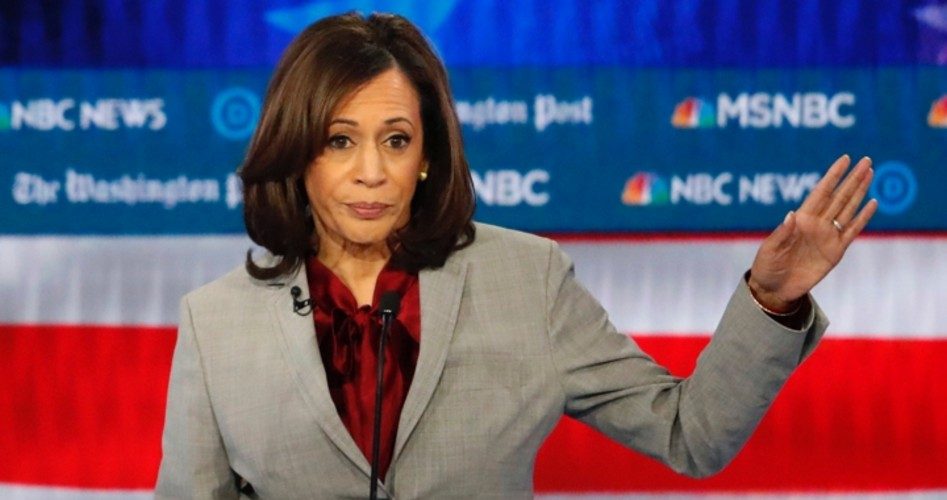
Democrat presidential candidate Kamala Harris, the California leftist who briefly surged in the polls after suggesting that rival Joe Biden is a closet racist, has dropped out of the race for the White House.
Harris’ days were numbered, as The New American predicted last week, after a key staffer quit and the New York Times published the staffer’s resignation letter in a report about the campaign’s disorganization and poor management.
Harris announced her departure from the race to become the Democrat nominee hours ago.
Though Harris rose in the polls after her confrontation with Biden in the second debate, she quickly faded, never to be heard from again.
No Path Forward
“I am not perfect,” Harris humbly confessed in her sayonara at Medium.com. “But I will always speak with decency and moral clarity and treat all people with dignity and respect. I will lead with integrity. I will speak the truth.”
She didn’t treat U.S. Supreme Court Justice Brett Kavanaugh with “dignity and respect” when she joined the leftist lynch mob that smeared him as a rapist during his confirmation hearings. And she didn’t speak the truth when she called former cop Darren Wilson a murderer five years after he shot black thug Michael Brown in self defense in 2014.
But “here’s the truth today,” she wrote. “My campaign for president simply doesn’t have the financial resources we need to continue. I’m not a billionaire. I can’t fund my own campaign. And as the campaign has gone on, it’s become harder and harder to raise the money we need to compete.”
Thus, she won’t tell supporters, volunteers, and, presumably, angry campaign staffers, “that I have a path forward if I don’t believe I do.”
And so yet another quixotic campaign for president ends.
But that doesn’t mean Harris is finished. With the refrain “we will keep up that fight,” Harris explained that her effort “has been about fighting for people whose voices that have not been heard or too often ignored” and ticked off a list of firsts: “first to put the injustice of inadequate teacher pay on the national agenda,” and “the first to demand justice for our children, declaring we would take bold executive actions to stop gun violence.”
She was also “the first,” she wrote, “to demand justice for women with a plan to block unconstitutional state abortion laws.”
And though “I am no longer running for President,” she warned, “I will do everything in my power to defeat Donald Trump and fight for the future of our country and the best of who we are.”
Fouled-up Campaign, Low Poll Numbers
Maybe, but Harris didn’t do everything in her power to manage the campaign properly, as the New York Times reported.
“Harris and her closest advisers made flawed decisions about which states to focus on, issues to emphasize and opponents to target, all the while refusing to make difficult personnel choices to impose order on an unwieldy campaign, according to more than 50 current and former campaign staff members and allies, most of whom spoke on condition of anonymity to disclose private conversations and assessments involving the candidate,” the newspaper observed.
And in a scathing letter that divulged just what a mess the campaign was, State Operations Director Kelly Mehlenbacher wrote that she had “never seen an organization treat its staff so poorly.”
But even those problems wouldn’t have been so harmful if voters had given Harris more support financially, which would have permitted a stronger, better-managed campaign. The lack of finances that partly caused Harris to drop out can be seen in her polling numbers.
When she ended her effort today, she stood at 3.4 percent in the Real Clear Politics average of voter-support surveys. The campaign went nowhere after she flipped down the race card on Biden in June. Since August, she’s reached 10 percent just once.
And as TNA reported on Friday, the RCP average for the early primary states of Iowa and New Hampshire were just as bad.
Longshot
Harris’s bid was always a longshot, but just how much of one was unclear until she fell behind Pete Buttigieg, the unknown mayor of South Bend, Indiana.
Harris was much more well known, likely because of her role in the Kavanaugh smear campaign, but she couldn’t parlay that name recognition into a credible national campaign. She stands almost eight points behind a small-city mayor no one knew existed until he announced for president.
One might attribute Harris’s failure to the media’s preferring a white homosexual over a straight black woman, but the more simple explanation might be that she wasn’t a compelling candidate.
Photo: AP Images
R. Cort Kirkwood is a long-time contributor to The New American and a former newspaper editor.



